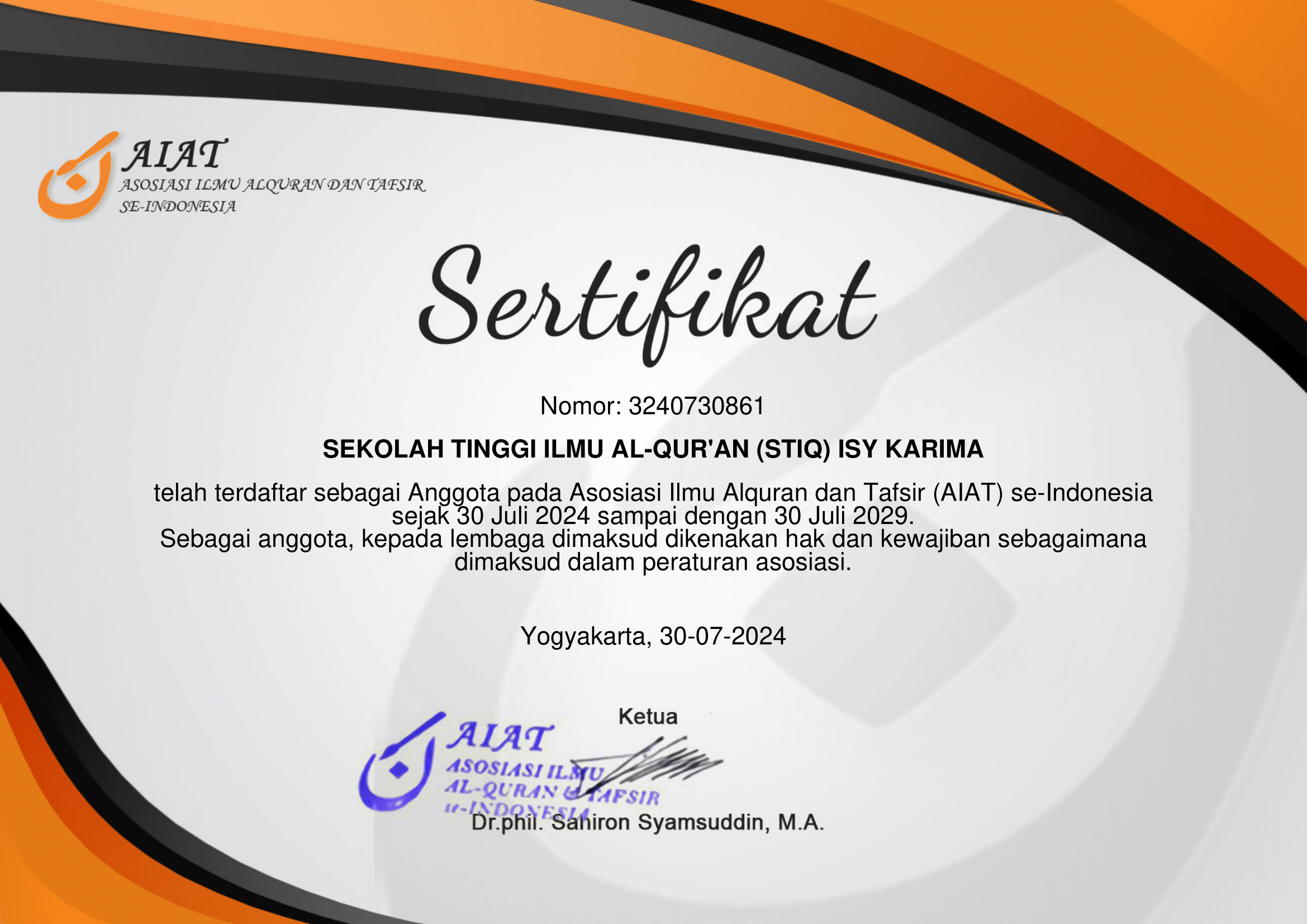Health Benefits of Ajwa Dates (Phoenix dactylifera L) : A Qur’anic Thematic Interpretation and Scientific Perspective
DOI:
https://doi.org/10.58438/alkarima.v9i2.374Keywords:
Health Benefits, Islamic Perspective, Phoenix dactylifera LAbstract
This study focuses on the health benefits of Ajwa dates (Phoenix dactylifera L.) through a Qur’anic thematic interpretation combined with relevant scientific findings. Unlike previous studies that broadly discuss plant diversity, this research specifically highlights Ajwa dates, which are mentioned in hadith and valued in Islamic tradition for their protective and therapeutic properties. The thematic interpretation (tafsīr maudhū‘ī) method was applied by collecting and analyzing Qur’anic verses and hadith related to dates, then synthesizing their meanings in light of classical exegesis and contemporary scientific literature. Scientific data were obtained through a qualitative literature review of medical and nutritional studies. The results indicate that Ajwa dates are rich in nutrients, antioxidants, and bioactive compounds with proven health benefits, such as enhancing immunity, reducing blood pressure, supporting women’s reproductive health, and providing protective effects against toxins. Theologically, the Qur’an and hadith emphasize dates as blessings and sources of healing, which are now further supported by scientific evidence. This study concludes that Ajwa dates hold significant value as both a Qur’anic health guidance and a scientifically supported natural remedy, offering insights into integrating faith-based perspectives with modern health sciences.
Downloads
References
Ahmad Said Fadillah, Rachmat Faisal Syamsu, & Asrini Safitri. (2024). Effectiveness of Giving Ajwa and Sukari Dates in Increasing Blood Sugar Levels After Fasting.Journal of Nursing and Midwifery (NersMid), 63–69. http://nersmid.unmerbaya.ac.id
Amiruddin, M., & Rusyd, I. (2024). Effectiveness of Ajwa Date (Phoenix dactylifera L.) Flesh and Seed Extract on the Growth of Microorganisms in the Oral Cavity.E-GiGi, 13(1), 132–137. https://doi.org/10.35790/eg.v13i1.55963
Anugrah, I., Hambali, K. S., Syamsu, R. F., Bamahry, A., & Murfat, Z. (2022). Comparison of Antioxidant Content of ?-Carotene Compounds of the Carotenoid Group in Ajwa Dates (Medinah), Sukari Dates (Egypt), Medjool Dates (Palestine), Khalas Dates (Dubai), and Golden Valley Dates (Egypt).Fakumi Medical Journal: Medical Student Journal, 2(9), 612–618. https://fmj.fk.umi.ac.id/index.php/fmj
Fadhila, U. T., Royani, I., Murfat, Z., Mappaware, N. A., & Khalid, N. (2023). The Effect of Consumption of Ajwa Dates (Phoenix Dactylifera) on Hemoglobin Levels in Anemic Pregnant Women.MAHESA: Malahayati Health Student Journal, 3(10), 3203–3217. https://doi.org/10.33024/mahesa.v3i10.11168
Febriyanti, S. (2024). Implementation of Nursing Care Intervention Using Date Palm Juice with Additional Red Yeast Juice Related to Increase/Decrease in Platelets in Dengue Hemorrhagic Fever (DHV) Patients in the Treatment Room of Hospital X.Journal of Scientech Research and Development, 6(1), 1763–1773. https://idm.or.id/JSCR/inde
Fikayuniar, L., Putri Waldani, D., Lidia, I., & Sri Wahyuningsih, E. (2022). Antibacterial Activity Test of Ajwa Date Seed Extract (Phoenix dactylifera L.) Against Staphylococcus aureus Bacteria.Journal of Pharmacopolium, 5(2), 148–154. http://ejurnal. universitas-bth.ac.id/index.php/P3M_JoP
Hamsah, M., Andi Mappaware, N., Royani, I., & Bulango, N. (2024). Case Report: Effect of Ajwa Dates Consumption on LDL Levels in Perimenopausal Women. Journal of Tropical Biology, 24(4), 556–560. https://doi.org/10.29303/jbt.v24i4.6737
Hery Sahputra. (2024). Text and Context of Interpretation of Verses About Fruits in the Qur'an.Journal of Islamic and Social Sciences (Al-Mustla), 6(1), 281–297. https://doi.org/10.46870/jstain.v6i1.1102
Husaidah, K. S., & Nurlinda, A. (2019). The Effect of Giving Ajwa Dates (Phoenix dactylifera) on Changes in Blood Pressure in Pregnant Women with Hypertension.Jurnal Window of Health, 2(1), 34–43. http://jurnal.fkmumi.ac.id/index.php/woh/article/view/woh2105
Ibn Kathir. (2003). Tafsir Ibn Kathir: Abridged (T. al-Hilali & M. Khan, Trans.). Riyadh: Darussalam.
Khoiri, S., & Sulthoni, A. (2024). Quo Vadis I’jaz ’Ilmi: Characteristics and Intersection with Scientific Facts.Al Karima Journal, 8(1), 26–43. https://doi.org/10.58438
Masfufah, M., Safitri, S., & Kariani, N. K. (2023). Potential for Increasing Hemoglobin Levels by Giving Red Spinach Date Juice to Adolescent Girls.Ghidza: Journal of Nutrition and Health, 7(2), 227–233. https://doi.org/10.22487/ghidza.v7i2.1024
Miftahul Hasanah, A., Kurniawan, K., & Fadholah, A. (2023). Comparison of Total Flavonoid Content of Infusion and Soaking Methods of Ajwa Dates (Phoenix Dactylifera L.) Using UV-Vis Spectrophotometry.Global Scientific Journal of Pharmacy, 9.
Mutiara, Andi Mappaware, N., Isnaini Arfah, A., Wahid, S., & Sari Dewi, A. (2024). Literature Review: The Effect of Ajwa Dates (Phoenix Dactylifera L.) on.Journal Of Social Science Research, 4(1), 5872–5882. https://j-innovative.org/index.php/Innovative
Royani, I., Hamzah, M., Latief, S., & Syahril, E. (2022). The Potential of Ajwa Dates (Phoenix Dactilifera L.) for Women's Reproductive Health in Islamic Literature and Current Scientific Research: Literature Review.UMI Medical Journal, 7(2), 152–165.
Syarifah, U., & Fahimah, S. (2020). ZAGHLÛL RÂGHIB MUH{ AMMAD AL-NAJJÂR’S METHODS AND PRINCIPLES OF SCIENTIFIC EXEGESIS: A Review of Tafsîr al-Âyât al-Kawniyyah fî al-Qur’ân al-Karîm. Ulul Albab, 21(2), 289–11. https://doi.org/10.18860/ua.v21i2.10227a
Windy Rahmawati, Y., & Budiono, I. (2021). The Effect of Ajwa Dates (Phoenix Dactylifera) Concentration in Making Sports Drinks Reviewed from Nutritional Content and Acceptability Article Info.Indonesian Journal of Public Health and Nutrition (IJPHN), 1(3), 768–775. https://doi.org/10.15294/ijphn.v1i3.49219
Zamilatul Azkiyah, S., & Rahimah, H. (2022). Analysis of Iron (Fe) and Vitamin C Levels in Date Palm (Phoenix Dactylifera L.) Fruit Extract.Formosa Journal of Science and Technology (FJST), 1(4), 363–374. https://journal.formosapublisher.org/index.php/fjst
Downloads
Published
How to Cite
Issue
Section
License
Copyright (c) 2025 Fingki Hariyana, Umaiyatus Syarifah , Bayyinatul Muchtaromah, Yes Setyowati

This work is licensed under a Creative Commons Attribution-ShareAlike 4.0 International License.
This work is licensed under a Creative Commons Attribution-ShareAlike 4.0 International License.











